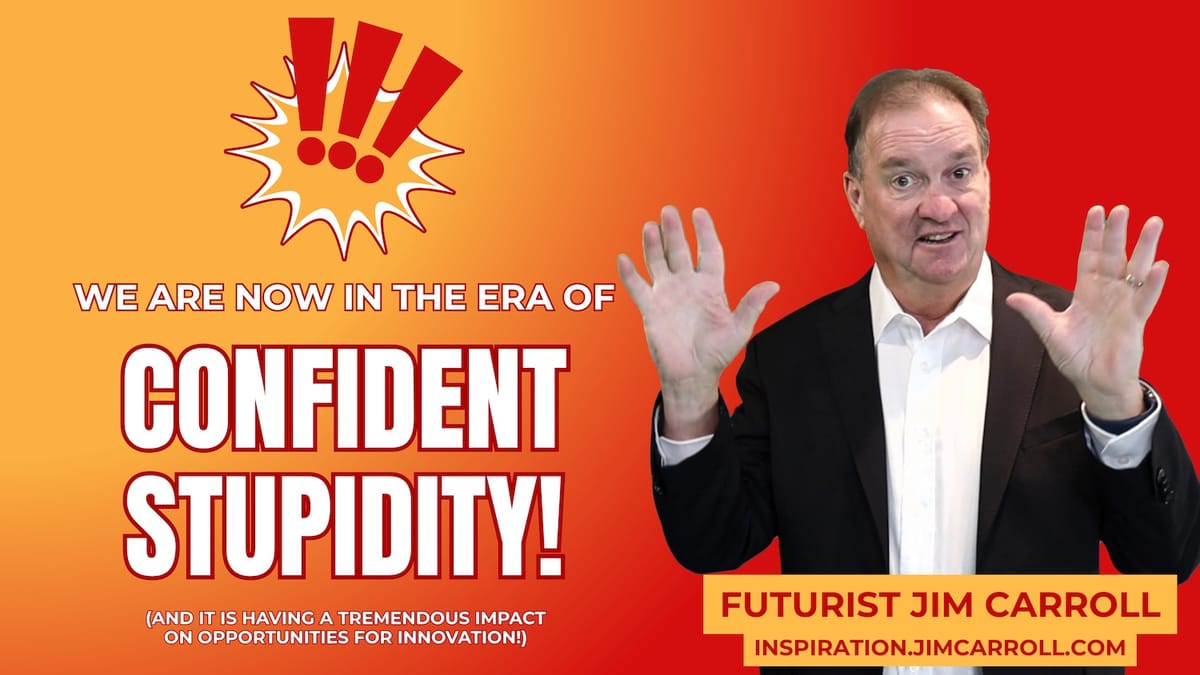"We are now in the era of confident stupidity! (and it is having a tremendous impact on opportunities for innovation!)"- Futurist Jim Carroll
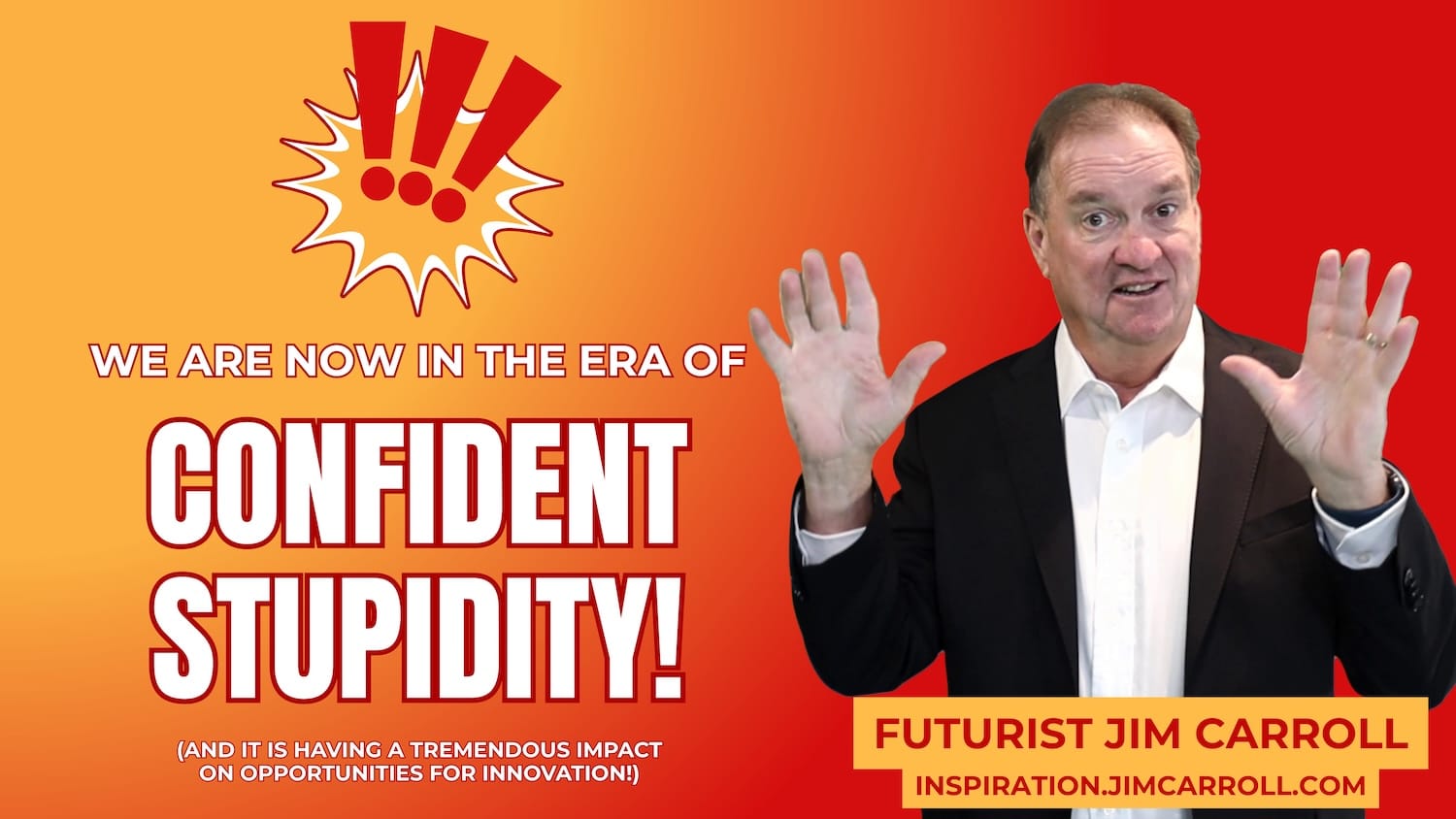
I've been saying for several months now that it's a pretty difficult time to be a futurist. Actually, sometimes it's maddening.
With that in mind, let's take on the issue of the "confident stupidity" that now surrounds us. The fact is, the rejection of expertise is reshaping business, innovation, and our future, and not in a good way. If you like, you can grab the little 10-page PDF I created - it's here - and share it around.
And I actually created two versions of the deck - here's the second one with a little more detail. It actually contains this nugget of information - the cost of confident stupidity!
- $2.8 trillion in lost market value - that's the estimated annual impact of misinformation on companies. Just ask anyone in the solar industry how things are going.
- 3.5x - the average delay in the adoption of new technologies and science
- 67% trust erosion - that's the decline in trust that people have in scientific institutions in the last decade.
Yikes.
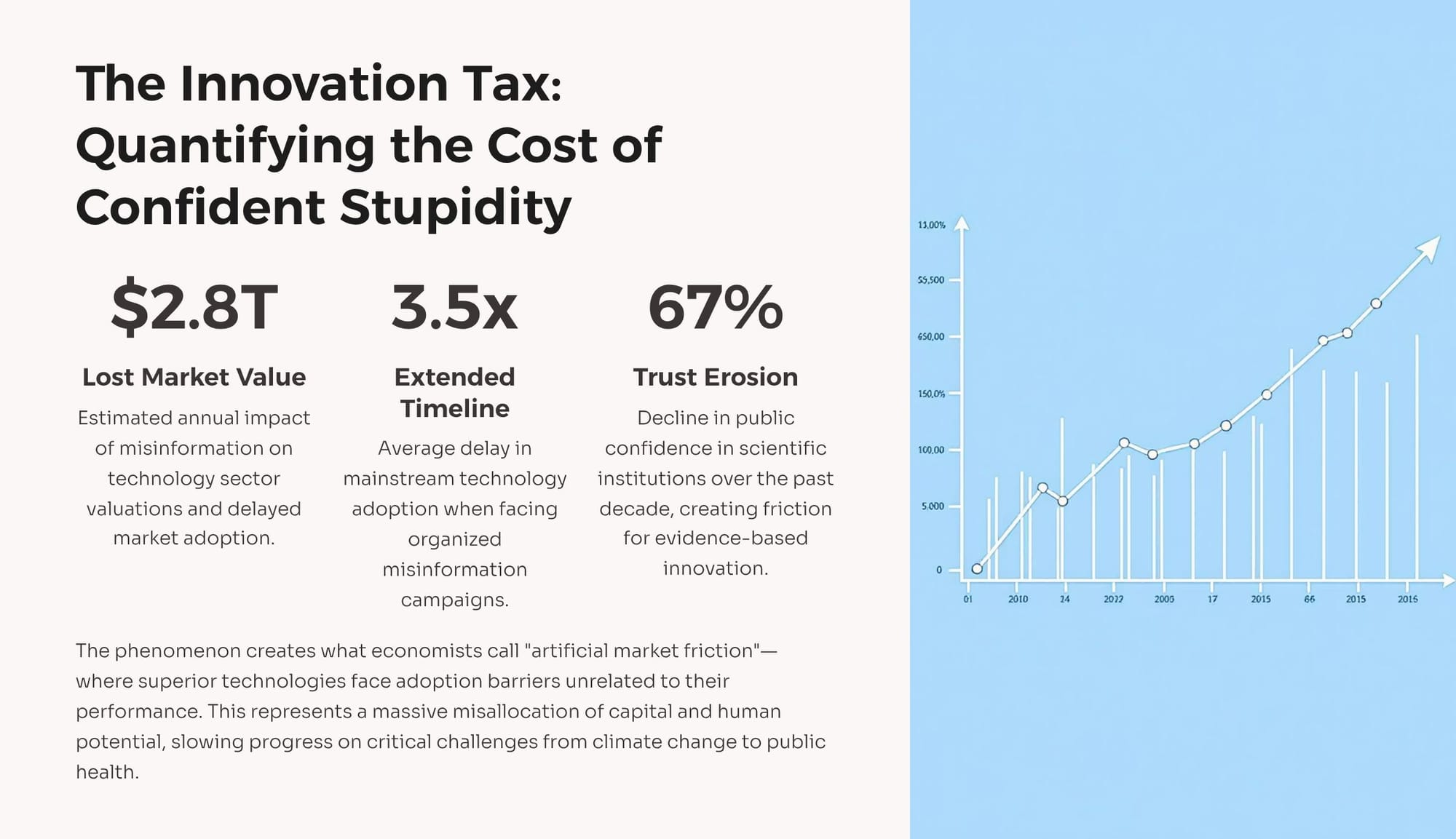
What is "confident stupidity"?
It isn't about a person's intelligence. I'll use the phrase to describe individuals who firmly reject expert knowledge on significant subjects such as science, technology, and health, even when faced with overwhelming evidence.
This behaviour is not the same as honest questioning or healthy skepticism. It is characterized by the confident dismissal of well-established facts in favour of alternatives that are appealing but false. Examples can be seen across various fields:
- Climate Change: Rejecting many decades of climate science, despite a 99% agreement among experts.
- Vaccines: Dismissing the medical consensus on the safety and effectiveness of vaccines.
- Technology: Claiming that proven innovations like solar power and electric vehicles (EVs) are "failures".
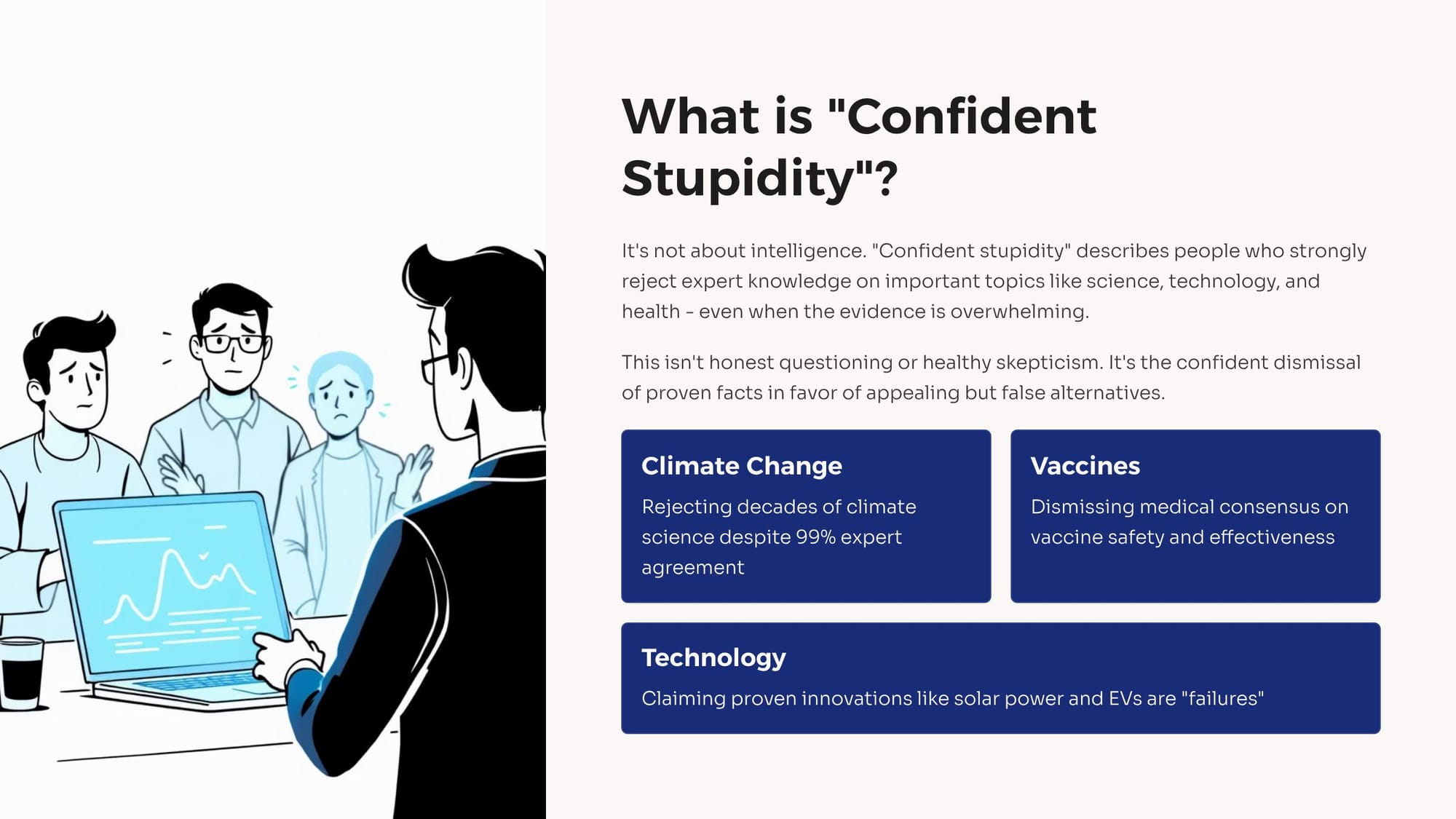
So what is the psychology behind the confidence? Well, quite a few things, actually.
Three key psychological factors help explain why people can become so certain about incorrect beliefs.
- Dunning-Kruger Effect: People who have limited knowledge in a specific area often overestimate their level of expertise. The less they know, the more confident they tend to become.
- Motivated Reasoning: We have an unconscious tendency to seek out information that confirms our existing beliefs. At the same time, we dismiss evidence that challenges those beliefs.
- Naive Realism: This is the belief that our personal view is the only one that is objective. Consequently, we may believe that anyone who disagrees with us must be uninformed, biased, or dishonest.
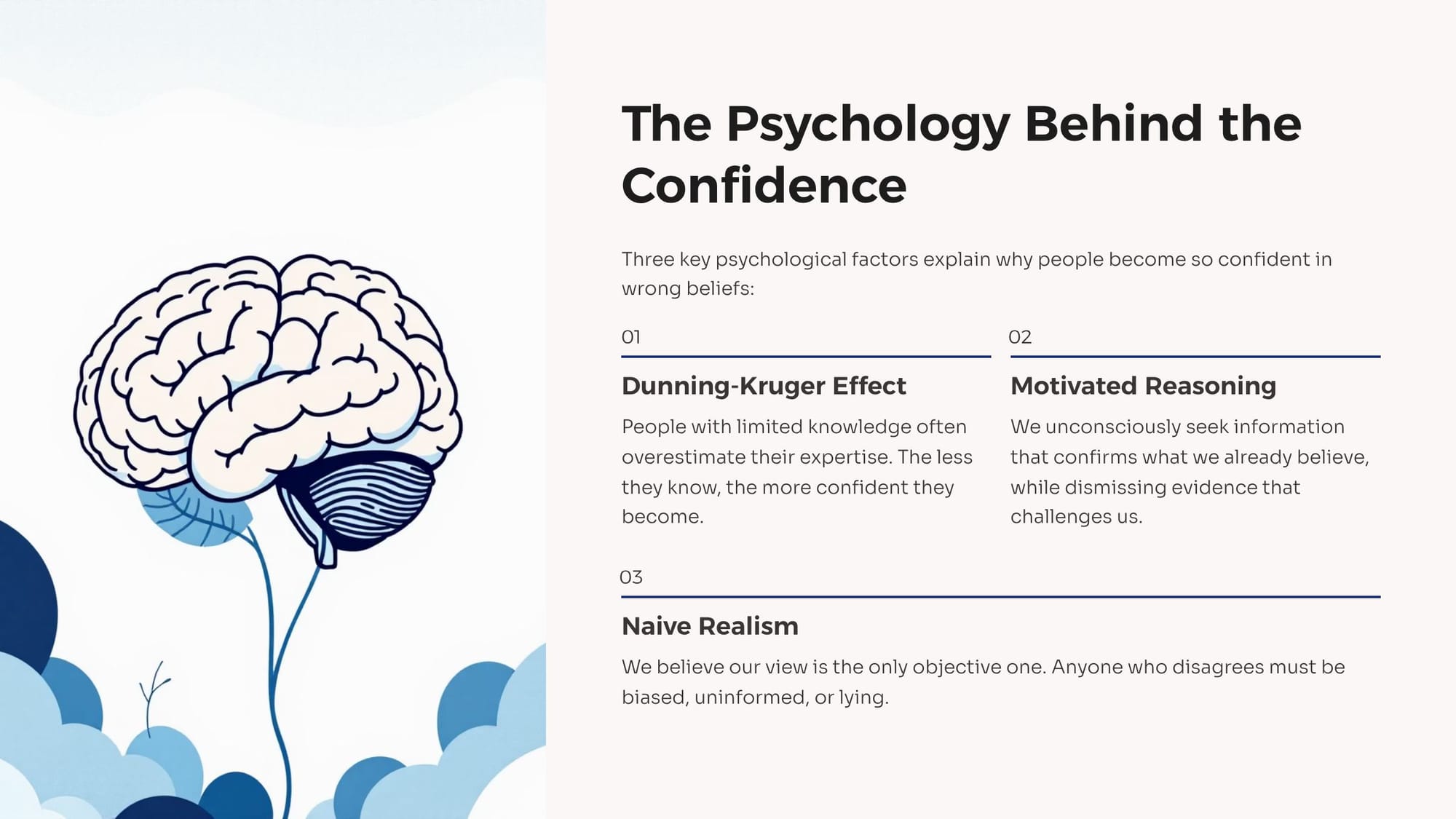
Individual psychology is not the only driver of this trend. Our culture has grown increasingly hostile toward expertise and formal education - more people don't like smart people. The result is that there is now a rising suspicion of universities, scientists, and other "experts". Many view them as out-of-touch elites who are pushing hidden agendas instead of seeking the truth.
These characteristics have always been with us, but the widespread connectivity of the last few days has brought together like-minded fools. Social media amplifies this by making everyone feel like an expert. A few minutes of online research can create the feeling of having years of education. This results in expertise being devalued while "common sense" and personal experience are elevated above scientific evidence. This easy access to online information can create an "Illusion of Knowledge," making people feel more knowledgeable than they are.
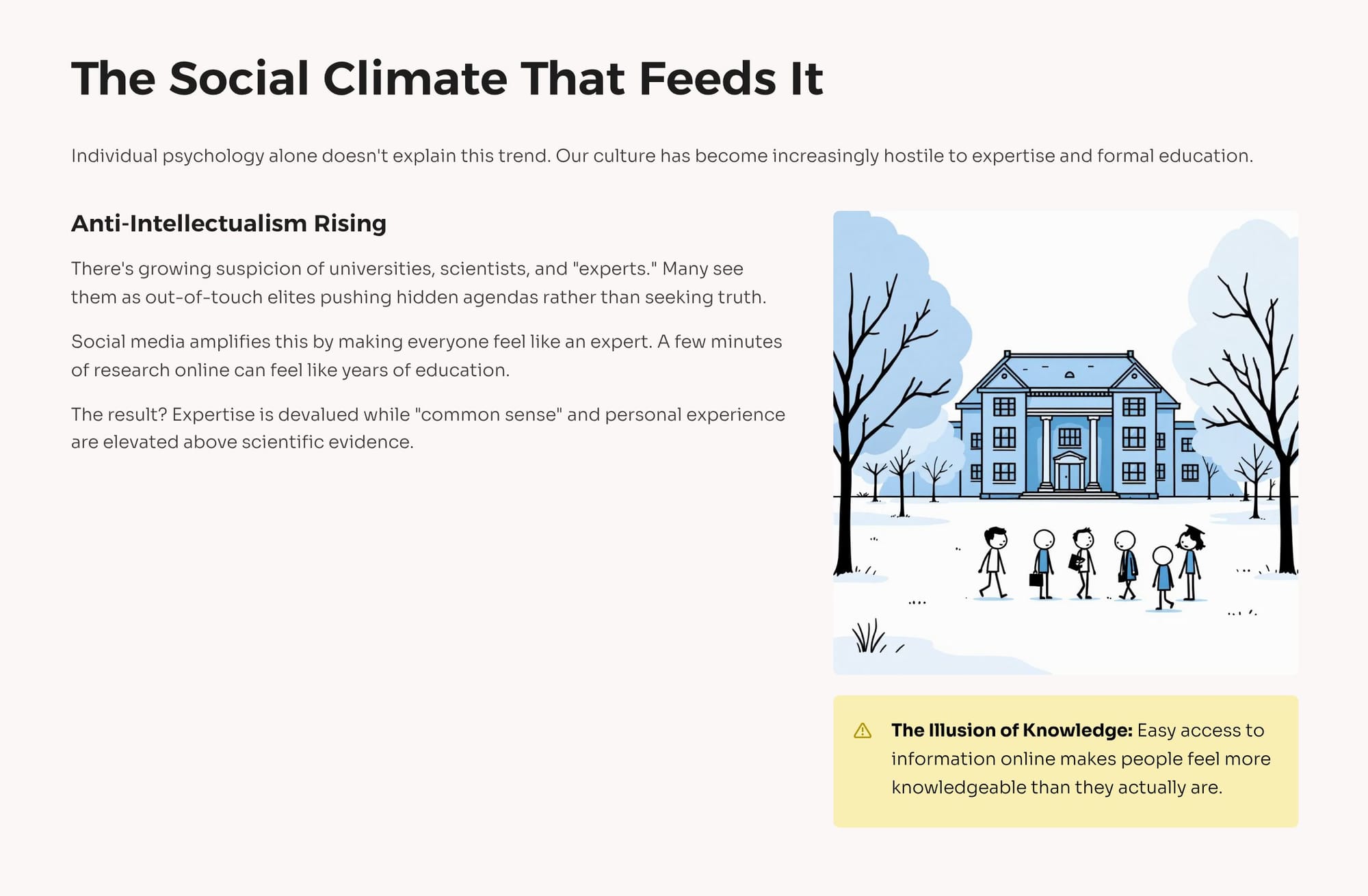
We also all know that these false narratives now spread like wildfire. The people who share their 'expertise' have mastered the art of the illogical, using a consistent set of tactics, which are then amplified by social media algorithms. These tactics include:
- fake experts: This involves promoting people who are unqualified as authorities on a subject. At the same time, the credibility and motivations of real experts are attacked.
- cherry picking: This is the practice of highlighting isolated studies or specific data points that support a particular view. Overwhelming evidence to the contrary is ignored.
- conspiracy thinking: This tactic dismisses entire bodies of evidence by claiming they are part of secret plots by governments, corporations, or global elites.
Social media algorithms often boost content that is emotionally engaging, and false, outrageous claims tend to get more clicks than nuanced facts - because too many people rise to the bait and get engaged.
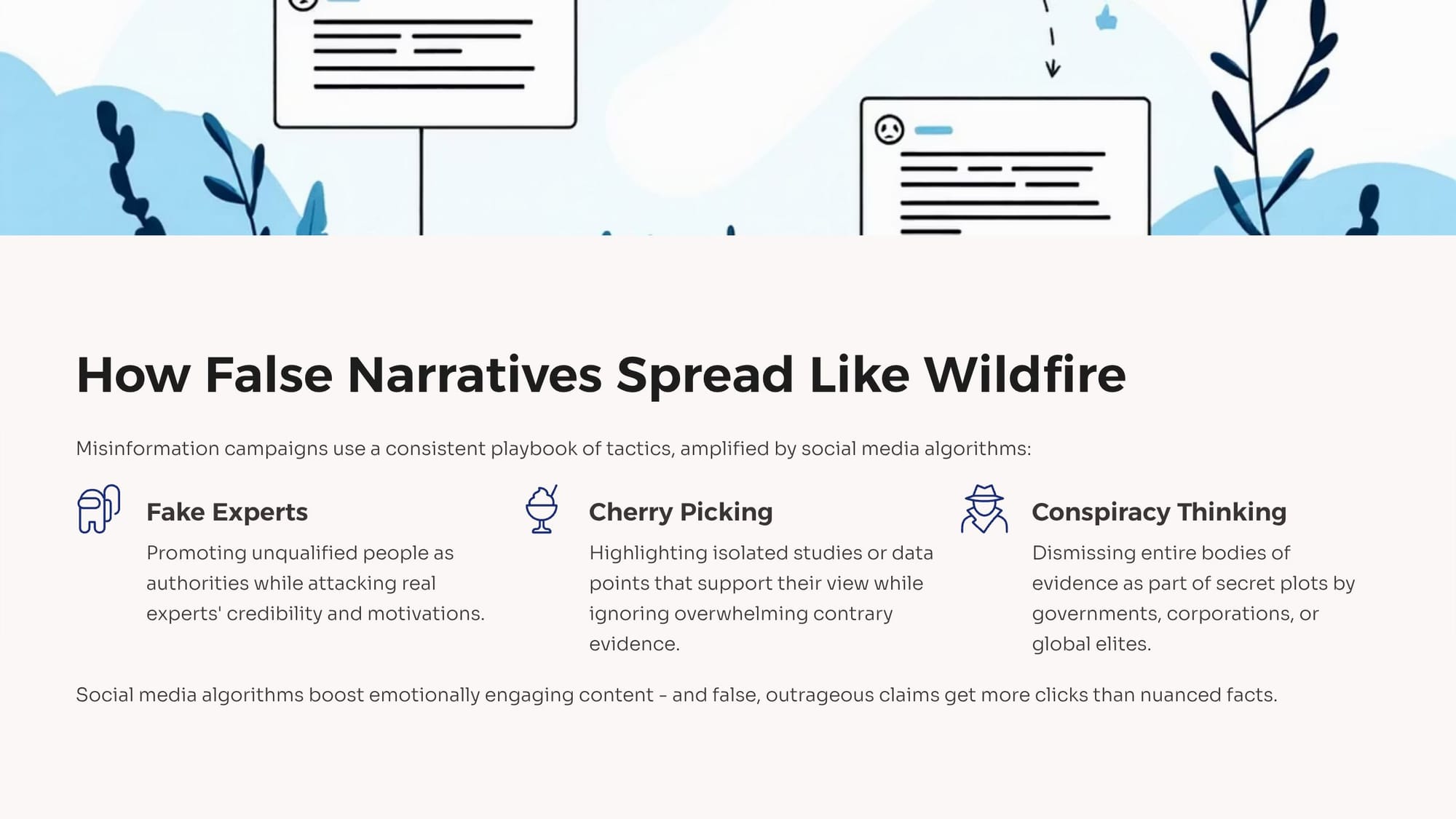
All of this has a real-world impact: Three major examples come to mind, with the result that real damage is being done to opportunities for innovation and the very real opportunities for progress:
- solar energy is a "failure": Despite solar power becoming the cheapest source of electricity globally, false narratives persist that claim it is unreliable and expensive. This slows down both adoption and investment.
- healthcare science is full of "fraud": Misinformation related to COVID-19 damaged public trust in health institutions. This led to preventable deaths and a reduction in vaccine uptake around the world.
- electric vehicles are a "bust": While EV sales have reached record highs and owner satisfaction is at 94%, persistent myths about their range and reliability have slowed market adoption.
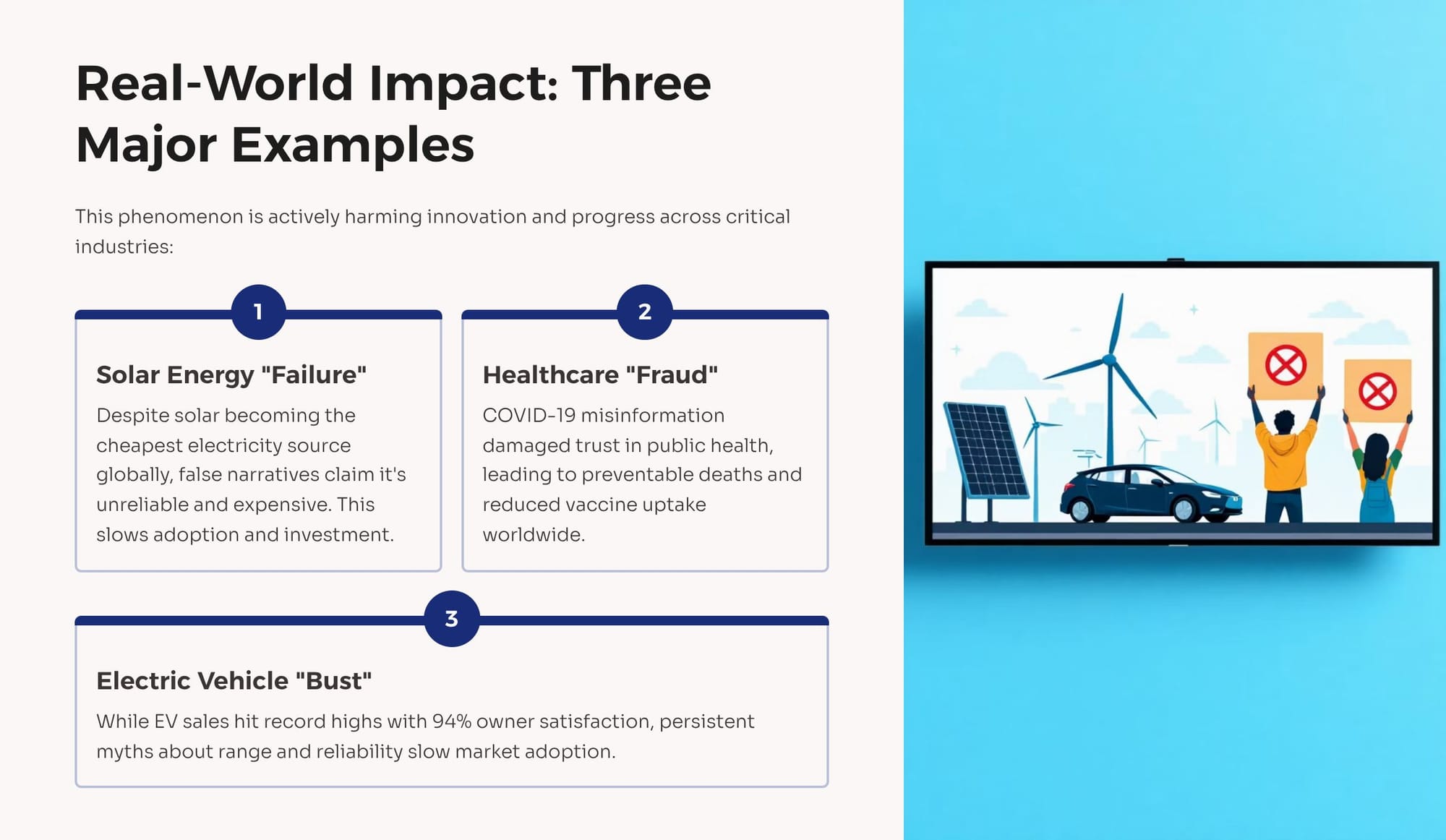
With all this, the business impact is already here. Companies are losing contracts, people are losing jobs, and industries are being sent into an almost irreversible decline. Much of this didn't need to happen.
Think about it: companies in many industries are feeling the effects of widespread denial of science and technology. The public trust in scientific institutions has seen a 40% drop over the last decade. People have come to accept the idea that going back is better than going forward. This has led to several challenges:
- slower market adoption: Clean energy companies face difficulties in funding, EV manufacturers have to combat persistent myths, and pharmaceutical companies struggle with vaccine hesitancy.
- policy uncertainty: Climate policies often become political footballs, funding for research and development becomes controversial, and regulatory approval processes face new skepticism. An estimated $2 trillion in global clean energy investment is lost annually due to misinformation campaigns.
- talent challenges: Scientists are subjected to public attacks and harassment, funding for STEM education is under pressure, and expert advisory roles are becoming politicized
On top of all this is a massive geopolitical realignment, a topic I explored in depth in my post America's Retreat. If you haven't read it, I would encourage you to do so.
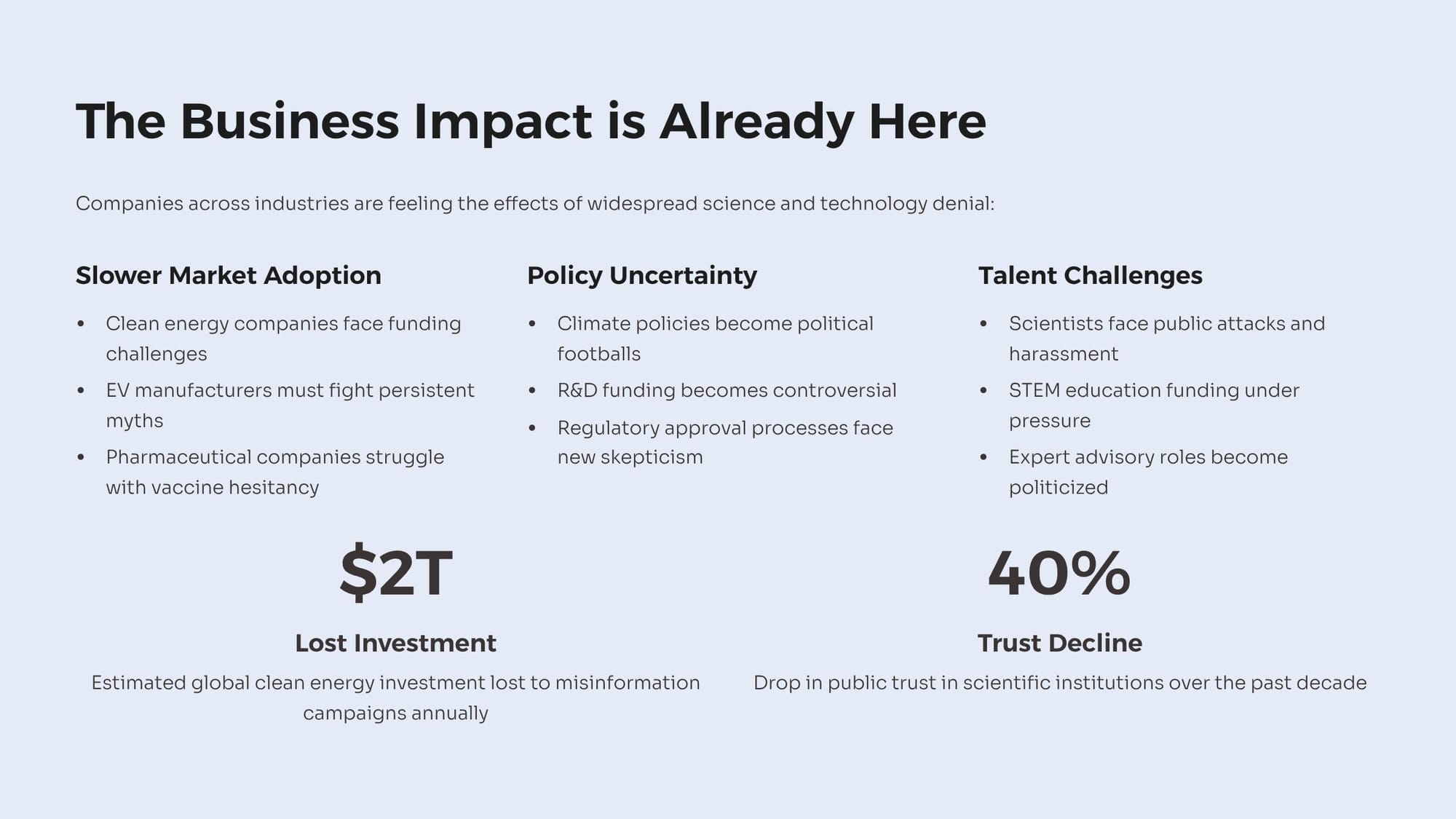
The consequences for scientific progress and breakthrough technologies are profound.
- funding dries up: Investors are hesitant to support technologies that face public skepticism, even if their scientific merit is sound.
- talent exodus: Bright minds may avoid fields that are under attack, opting for safer career paths in less controversial areas.
- progress slows: Essential innovations needed to address climate change, health, and technology advancement are met with unnecessary roadblocks.
The irony is that the very technologies that could solve some of humanity's biggest challenges are being rejected by the people who need them the most.
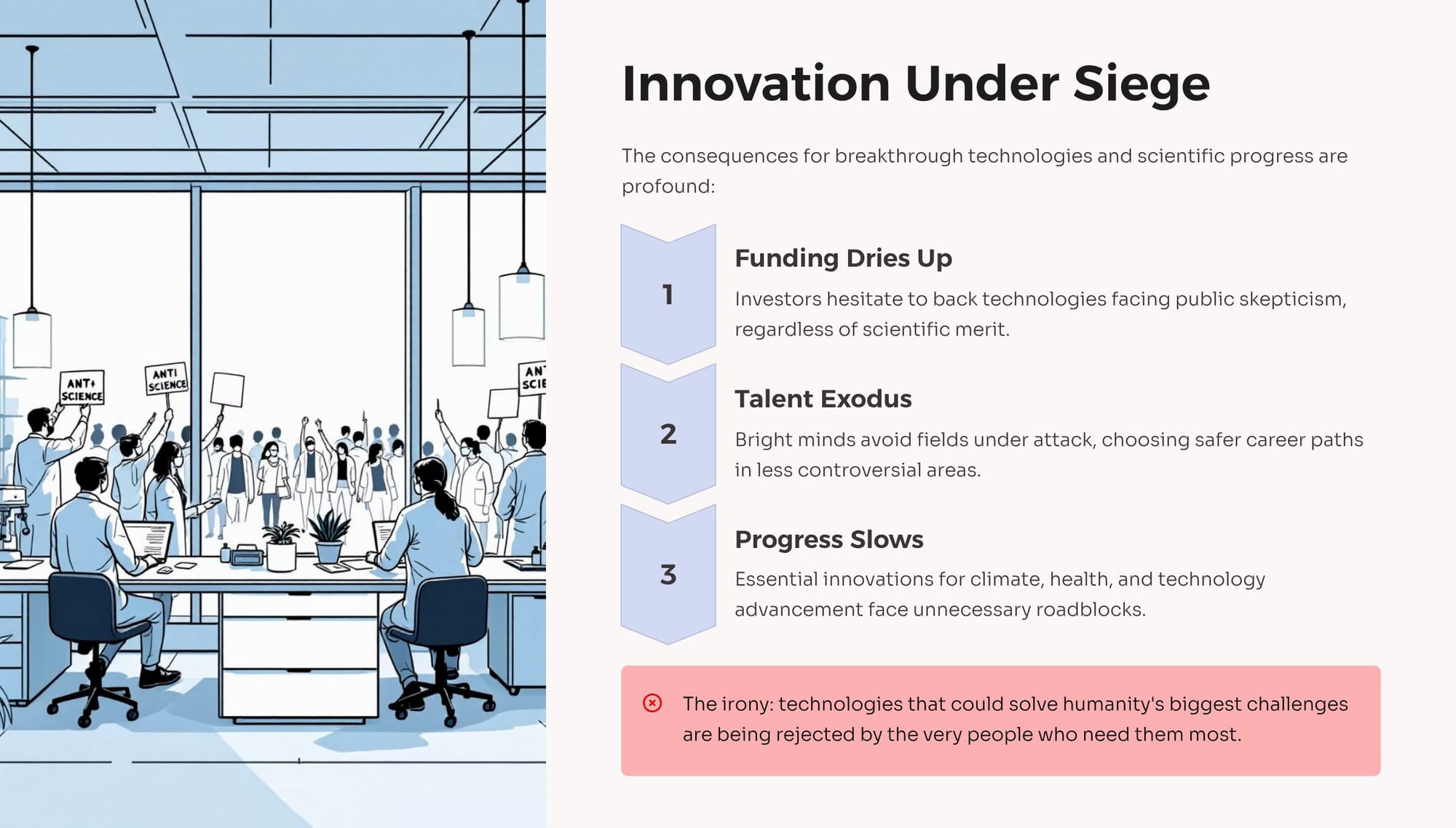
What does this mean for our future? For a futurist, it suddenly means that a lot of people simply don't believe the very trends you focus on, come to disbelieve many of them, and simply refuse to listen. It's a new form of Timothy O'Leary's mantra - people are 'turning off, tuning out, and dropping out." I find the whole thing to be maddening. And although I try to be very optimistic about the future, I find that all of this could lead us further down the very Pessimistic Path,which could lead to:
- climate solutions are being delayed by decades.
- medical breakthroughs are facing public rejection.
- a further decline in educational standards.
- erosion of economic competitiveness.
- a breakdown in international cooperation.
A small part of me hopes that this is all just a bit of temporary societal insanity that will begin to come to an end with some sort of well-anticipated event. This Optimistic Alternative could lead to:
- successful digital literacy programs.
- social media platforms prioritize accuracy.
- improved science communication.
- the rebuilding of trust in expertise.
- an acceleration of global innovation.
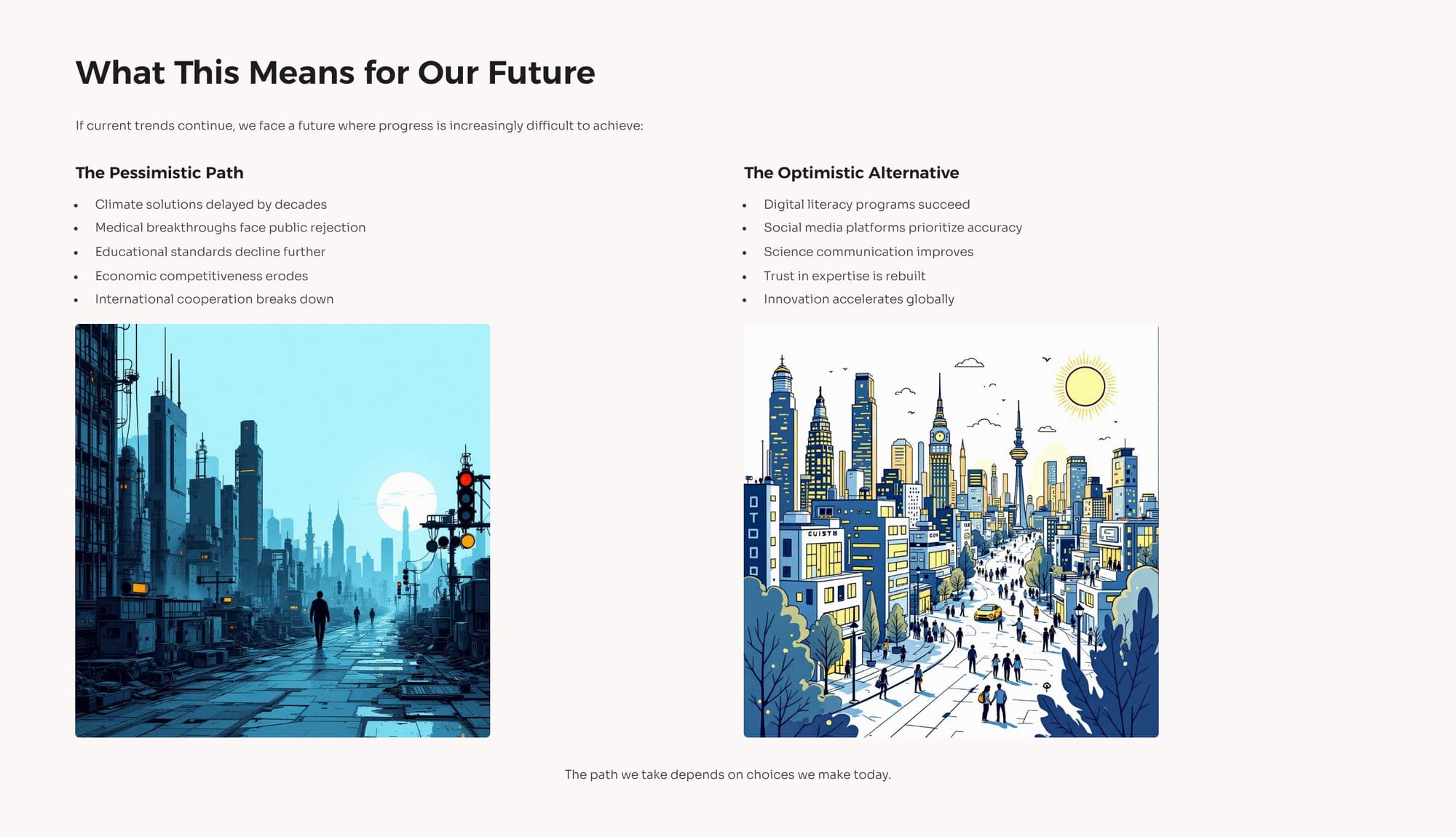
The path we take will depend on the choices we make today.
And the fact is, things don't look good. Have you ever seen the movie Idiocracy? If not, watch it. Here's the trailer.
https://www.youtube.com/watch?v=6lai9QhBibk
We seem to be heading there fast.
Futurist Jim Carroll is baffled by the mindset of many of the people he meets.

